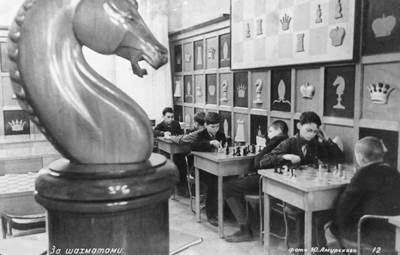Chess Obsessed II
What rhymes with chess? Bless, dress, guess, mess, press, stress -- Yes! Bless this mess? Those are one syllable words. There are even more two syllable words that rhyme, but the word that interests me for this post is 'obsess', as in last week's Chess Obsessed. The motivation for that post was simple:-
I found a half-dozen recent eBay photos from roughly the same period as the item in the 'Hyde' post, couldn't decide which I liked best, and chose the one that I knew most about.
For this post I chose another photo from the same batch, this time on a subject that I would like to know more about.

The description said,
Russia USSR real photo card 1960s Soviet chess club. Boys pioneers. Photo card by Amursky, 1960s. Size 14.5 * 9.7 cm
What would I like to know more about? Chess in the Soviet Pioneer clubs. I started with a reliable source about which I blogged ten years ago:-
- 2009-04-19: D.J. Richards, 'Soviet Chess'
- 2009-04-26: D.J. Richards, Russian Lecturer
Although the word 'Pioneers' doesn't appear in the index of 'Soviet Chess', the phrase 'junior chess' does, and chapter five is titled 'Chess among Women and Juniors'. First, a digression : the relevant passage on junior chess (p.59-60) is immediately preceded by an important fact about Soviet women's chess that is worth keeping in mind:-
From 1938, although republic and city championships continued as before, championships of the U.S.S.R. for women were dropped from the calendar as it was hoped that women would compete in the men's championship. This policy proved misguided, however, as the difference in standard between the sexes was too great, and after the end of the Second World War separate championships for women were again instituted.
Back to junior chess, the chapter continues:-
During the [1930s] the number of schoolboys enrolled in the chess organization increased enormously. In the previous decade, although isolated clubs, most notably in Leningrad, and a few senior players had taken an interest in the younger generation, the general attitude towards enrolling juniors in the chess movement was far from favourable. Later, however, chess clubs were started at Pioneer Houses and often in schools. (The game was never taught as part of the school curriculum.) This work took such rapid root that almost 100,000 school-children competed in the qualifying tournaments for the All-Union junior championships of 1934 and 1936.
Many present-day Soviet grandmasters received instruction in the chess clubs of Pioneer Houses, which remain still the chief centres for junior chess today. Smyslov and Averbakh, for example, were taught at the Pioneer House in Moscow, Taimanov and Spassky in the Leningrad Pioneer House and Bronstein at a similar institution in Kiev. Petrosyan and Nona Gaprindashvili both learnt the game in the Tbilisi Pioneer groups.
One of the dangers facing Western masters visiting the Soviet Union since the mid thirties has been a simultaneous display against Russian schoolboys. The first foreign masters to experience their strength were Lasker, Spielmann and Liliental at the time of the 1935 Moscow tournament, but the most striking result, from the schoolboys' point of view, was a display given in 1951 by the English master Wade, who against thirty Moscow young pioneers scored ten draws and twenty losses.
Poor Bob Wade -- he scored +0-20=10 in a simul against children. The phrase 'chess obsessed' once referred to an entire nation.




No comments:
Post a Comment